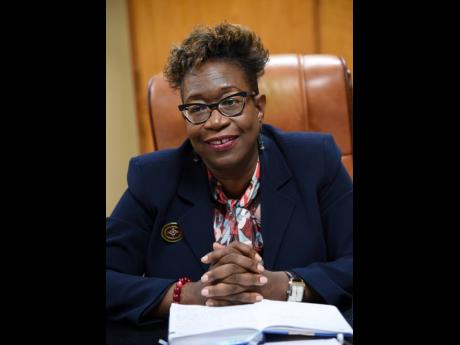Editorial | Reforming the DPP’s post
The Public Service Commission (PSC) should provide greater clarity on Paula Llewellyn’s seemingly temporary disengagement as director of public prosecutions (DPP), the basis on which that announcement was made by the attorney general, and the terms upon which she elected to be sidelined.
At the same time, this development provides another opening for Jamaica to engage in a frank conversation about how people should be appointed to sensitive posts, such as the DPP and the chief justice, and whether these jobs should be subject to term limits. This newspaper supports reform and believes that the opportunity available to start with the DPP should not be missed.
Ms Llewellyn stepped aside to make way for Monday’s appointment of Claudette Thompson to act as DPP for six months, just shy of the former’s 16 years in office. The legality of the last seven months of Llewellyn’s tenure came under question after Prime Minister Andrew Holness used his big parliamentary majority to amend the Constitution in a fashion which the Full Court said “lends itself to the interpretation” that Ms Llewellyn was being afforded a second extension of her tenure that was not available.
Until last September’s hurried constitutional change (the bill was brought to Parliament, taken through all its stages and passed in a single afternoon), the DPP, like the auditor general (AuG), was required to retire at age 60. With respect to the DPP, the incumbent could be allowed to stay in office until 65. But that extension by the governor general had to be on the advice of the prime minister, after consultation with the leader of the Opposition.
DEBATE AND ACTION
Heading towards her 60th birthday in 2020, Ms Llewellyn requested a five-year extension of her tenure, which was strongly opposed by the Opposition. The Government ultimately proposed a three-year extension.
As that extension was concluding, Ms Llewellyn requested an additional two years, on which Prime Minister Holness apparently initially wavered, raising legal constraints.
But the Government subsequently brought the constitutional amendments, hiking the retirement age of the DPP and the AuG to 65. In the case of the DPP, the amendment allowed the incumbent to “elect to retire any time after attaining the age of 60 years”, which was seen as a way to circumvent any bar to its application to Ms Llewellyn.
While the court held that the Constitution, with respect to raising the retirement age, was properly amended, it ruled that the second element, regarding the incumbent electing to stay on after age 60, was unconstitutional, therefore null and void.
The Government initially argued that the ruling did not affect Ms Llewellyn’s position as DPP. However, on Sunday night, the attorney general announced that given what it claimed was “the ambiguity” in the court’s ruling, Ms Llewellyn “has advised that she is unable to carry out the functions of her office at this time”.
Apparently, Ms Llewelyn invoked that part of Section 96 (3) of the Constitution that allows for someone to act in the post if the DPP “is for any reason unable to perform the functions thereof”.
Notably, it was the attorney general who announced Ms Llewellyn’s action, rather than the justice ministry, which disclosed Ms Thompson’s acting appointment for six months.
This period should be well used for debate and action on a matter that last had substantial attention in 2018, when Prime Minister Holness announced Bryan Sykes’ purported appointment as acting chief justice, so that his performance could be assessed. The fallout was swift and sharp, and renewed concerns about how these posts should be filled. The DPP is easier to deal with.
TERM LIMITS
In the UK, the president of the Supreme Court, the country’s final court, is formally chosen by the Lord Chancellor, but after a broad-based selection panel interviews the applicants for the post, which is advertised. Since 2022, the mandatory retirement age for judges of the Supreme Court has been 75, up by five years.
Similarly, the post of DPP for England and Wales is advertised, and the candidates interviewed by a broad-based panel of legal/judicial stakeholders, although it is the attorney general who makes the formal appointment. The DPP has a five-year term.
In Canada, the attorney general refers up to 10 persons for the job to a committee of ministers, the law federation and recognised political parties. Their choice subsequently goes to a parliamentary committee ahead of the formal appointment by the attorney general. The DPP’s appointment is for seven years.
Australia’s federal DPP is appointed by the attorney general, who may give the director certain policy instructions. But any such instructions have to be in writing and must be gazetted. That appointment, too, is for seven years.
The clear common thread between these jurisdictions is that the position of DPP is open to competition, and term limits are applied to the post. That is understandable, given the significant powers afforded to DPPs, which, in the case of Jamaica, are constitutionally deeply entrenched and without oversight.
However, Jamaica, if it wished, could (in the ruling by the Full Court on the constitutionality of the action to raise the retirement age of the DPP) with relative ease, further amend Section 96 (1) of the Constitution to open the post to competition and place a term limit on it.
If the Government ultimately prevails in its appeal of the court’s ruling, the decision will likely be moot. In the normal course of events, Ms Llewellyn would have demitted office in 18 months. And should the matter be decided before then, it’s hardly that, in the circumstance, she would wish to return to the job. It would make sense, therefore, that the Government does what is best in the long-term interest of the country.

